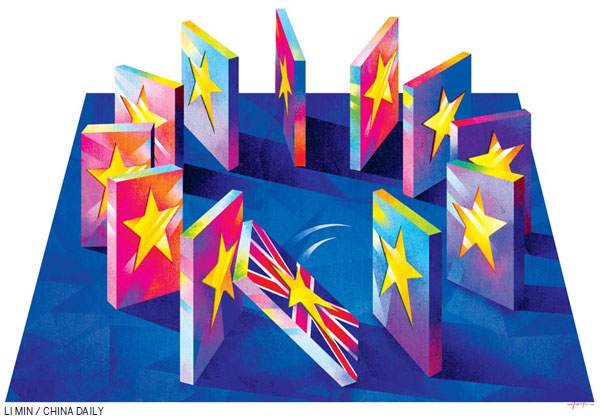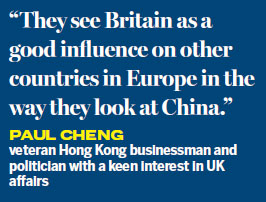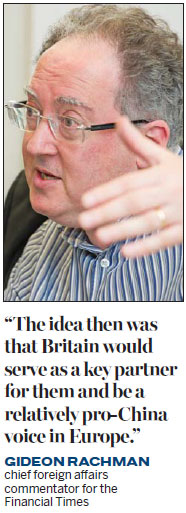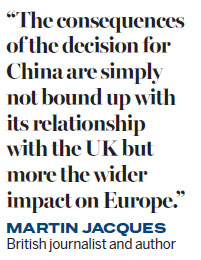Brexit strategy
Updated: 2016-06-17 08:29
By Andrew Moody(China Daily Europe)
|
|||||||||
How would China react to Britain leaving the European Union?
Britain goes to the polls on June 23 to make one of the most momentous decisions about the future direction of the country.
People will decide whether to remain in the European Union - where the UK, the bloc's largest economy after Germany, has been a member for 43 years - or to leave.

|
Britain goes to the polls on June 23 to decide whether to remain in the European Union. The outcome could certainly have implications for Sino-British relations. Provided to China Daily |
Although the Chinese government remains neutral on such issues, the outcome could certainly have implications for Sino-British relations.
Those on the remain side argue ties could put in jeopardy the new "golden era" of relations cemented when Chinese President Xi Jinping visited the UK in October.
They stress that some of the trade and investment deals agreed as well the development of the City of London as the biggest offshore RMB center outside of Asia were partly predicated on the UK staying in the EU.
Those backing Brexit, however, insist that if the UK leaves the EU, it could focus on building a better independent trade and investment relationship with the world's second-largest economy as well as with India and the United States. China, after all, has still to conclude a free trade agreement and investment treaty with the EU after years of talks.
Some have also made the case that China prefers the UK to be in the EU because it has been a sympathetic advocate for the country's commercial interests, particularly recently over accusations of alleged Chinese steel dumping.
There are concerns also that if the UK left the EU, it could have implications for the 50,000 Chinese who currently study at Britain's universities.

Richard Portes, a professor of economics at the London Business School and a close observer of the Chinese economy, says a lot of the debate does not take into account the complexity of negotiating new trade agreements.
"It was estimated the other day that the UK would need 450 people to negotiate new trade agreements, and you just don't get these kind of people off the shelf. The reality is it would take a long time to do all this."
Portes, also founder and president of the influential Centre for Economic Policy Research, says leaving the EU would put at risk the progress the UK has made in attempting to build a new a partnership with China.
"A lot of the work that has been done would be severely undermined and it would be a big negative for the UK."
US President Barack Obama brought the complexity of trade negotiations to the fore in the debate when he warned on April 22 that the UK would be at the back of the queue in any trade deal with the US. It also brought into question where the UK would be in China's queue.
This had a short-term impact on the polls, with a sudden surge in support for the remain camp.
The precise trading arrangement a post-Brexit UK would have with China would partly depend on what leaving arrangements it negotiates with the EU.
It could go for the so-called Norway option and become part of the European Economic Area. This would allow it most of the benefits of actual EU membership in return for having to still abide with most of its regulations and treaties, as well as controversially, for some, accepting free movement of labor from the EU. This status is also enjoyed by Iceland and Liechtenstein.

The main alternative to this is the Canadian model, which involves coming to an individual arrangement with the EU. It took Canada an arduous five years to complete its negotiations. The best deals under this arrangement would likely come with accepting much of the current EU rules, although opting out of free movement of labor would be possible. Switzerland and Turkey have also negotiated this arrangement.
The third alternative is for the UK to have no deal with the EU and operate under World Trade Organization rules, which could involve facing high tariffs when trading with EU countries.
Ambrose Evans-Pritchard, international business editor at the Daily Telegraph, believes the UK would seek the Norway-style arrangement.
"Britain would be free to negotiate free trade with anyone it wanted to. I would imagine the relationship between the UK and China would be better under such an arrangement. For the UK, it is a kind of soft exit also."
Ruth Lea, economic adviser to the Arbuthnot Banking Group and a leading Brexit campaigner, says the debate about the difficulties in agreeing new trade treaties is overblown.
"I actually went to the US government website after President Obama made his comments. I found the only trade treaty the US was negotiating was the TTIP (the Trans-Atlantic Trade and Investment Partnership between the US and the EU). You would think from what he said there would be 20 or so in the pipeline."
Lea, a former head of policy at the Institute of Directors, a leading UK business body, says it would be relatively straightforward for the UK to agree new trade arrangements with countries such as China.
"I took the trouble to speak to a trade lawyer so as to get the legal position clear. I found out that if we left the EU, we could go to China, South Korea or whoever and say to them whether they would like to continue with the existing trade agreement. If they said yes, we could just continue with the existing EU trade treaty."
However, Gideon Rachman, chief foreign affairs commentator for the Financial Times, believes a Brexit vote would conflict with how China views the UK as an important power broker within the EU.
"I would be slightly surprised if the Chinese were in favor of Brexit because I think they regard Britain both as a place for investment and diplomatic influence, particularly after the famous Xi visit," he says.
"The idea then was that Britain would serve as a key partner for them and be a relatively pro-China voice in Europe. If the UK voluntarily cuts itself off from the European Union, it tends to undermine that position."
Paul Cheng, a veteran Hong Kong businessman and politician with a keen interest in UK affairs, agrees that China sees Britain's role within the EU as useful to its overall relationship with Europe.
"They see Britain as a good influence on other countries in Europe in the way they look at China. China also puts a lot of weight and emphasis on economic issues, and they would prefer to have negotiations or agreements with the EU as a whole and not just to have to deal with countries separately."
Cheng, author of On Equal Terms: Redefining China's Relationship with America and the West, also thinks China sees the UK government as abrogating its responsibilities by holding such a referendum, a view shared by many in the UK.
"The Chinese are not that familiar with referenda. They feel that when Western countries hold them, they are running away from their responsibilities and giving way to populists."

Evans-Pritchard at The Daily Telegraph believes that if the British are to choose to leave, they will have to do so in the knowledge that not only the Chinese but many in Asia and elsewhere will also regard it as an act of "strategic vandalism" on the world order.
Most economic commentators regard it as one of the three main risks to the global economy this year, alongside hikes in US interest rates and a slowing Chinese economy.
"Not one of the Western democracies would be in any way sympathetic because it breaks up the international order. I don't think those advocating Brexit have faced up to all the implications of it. If you leave you have to do it with open eyes and be aware of how the world views it," he says.
Evans-Pritchard, a long time Brussels correspondent, says the only response after a leave vote would be for Britain to commit to being a country with a greater international outlook.
"You have to be more globalist if you take a decision to leave. You have to commit to the European convention on human rights. You have to show that you are not just resiling from the world and are not just some pariah. I am not sure the leave campaign have fully understood this."
Jonathan Fenby, a China commentator and historian and author of Will China Dominate the 21st Century?, believes the Chinese government would prefer the UK to stay in the EU.
"I must say this was the view of the Chinese officials and other people I spoke to on a recent visit to Beijing. If Brexit wins there would be a big push from the UK to establish a bilateral trade agreement with China," he says.
"The question then would be how Beijing would react to one middle-sized economy wanting to negotiate a bilateral trade deal when they are much more used to dealing with bigger entities like the EU."
Rana Mitter, director of the Dickson Poon University of Oxford China Centre, thinks some Chinese investment in the UK could be at risk if Britain does decide to leave.
"It will certainly force China to have a long, hard, serious look, and possibly in a negative way, about investment in Britain and there will be a clear reasons for this," he says.
"The first is that the UK might not be such an attractive place to invest because Brexit is likely to negatively effect the economy, according to the majority of economic analysts. And second, China has valued its relationship with Britain because it is relatively easy to do business with, partly because of it being a gateway to the European Union."
One of the major questions is whether the Chinese will still be keen on establishing London as the biggest RMB offshore center outside of Asia.
George Magnus, senior independent economic adviser to Swiss bank UBS in London,says this would largely depend on whether London was undermined as a financial center by a Brexit decision with a lot of its euro-denominated business moving elsewhere.
"If a certain proportion of London's financial business is shifted to Europe, there might be implications for the RMB business development that is currently envisaged. Beneficiaries might include New York, if not Frankfurt or Paris," he says.
Martin Jacques, the British journalist and author of one of the most influential books about China in recent years, When China Rules the World, says the major worry for China of a Brexit decision is having to deal with an unstable Europe in the aftermath.
"The consequences of the decision for China are simply not bound up with its relationship with the UK but more the wider impact on Europe, with all the various fragmentary, nationalist and nativist forces likely to come to the fore.
"It could make Europe a much more difficult place for a country like China to operate."
Portes at London Business School believes a Brexit vote could even also put in jeopardy the visa status of Chinese students.

The number of such students is currently greater than those from all the EU countries combined. One of the main aims of the Brexiters is to curb immigration, although primarily from the rest of the EU, into the UK.
"We don't know what sort of immigration policy the leave faction will want to impose. It is completely up in the air. It is likely to include some reduction in Chinese student entry, perhaps not to the major universities, but they could be tough on those wanting to enter some of the lesser institutions," he says.
For Evans-Pritchard, who has now declared in his column he is supporting Brexit, the importance of the decision goes beyond the UK's relationship with China and even short-term economic issues but addresses more fundamental questions.
"Whether you lose 10 percent of GDP and there is a terrible crisis afterward seems to be neither here nor there. If you are going to do it, you have to accept things are going to get a bit rough. Compared with the Battle of Austerlitz of 1805 (Napoleon's greatest victory in the Napoleonic Wars) and May 1940 when Britain stood entirely alone against an entirely Nazi-occupied Europe, it is small beer."
For British author Jacques, Brexit may not lead to any British rejuvenation but may have a much more fundamental impact on the global order.
By undermining one of the West's pillar institutions, the European Union, it could be an important staging post toward China having a more dominant position in the world.
"The West has never properly recovered from the financial crisis and the decision to leave would be a further splintering of the mainstream Western consensus. All this is taking place in a very new climate, where China is rising."
andrewmoody@chinadaily.com.cn
|
From left, former mayor of London and Conservative Party politician Boris Johnson, moderator Aasmah Mir, Labour Party Remain campaigner Liz Kendall and Scottish National Party MP Alex Salmond take part in a debate on Brexit in London on June 14. Photos Provided to China Daily |
|
UK Independence Party leader Nigel Farage campaigns for Brexit in Sittingbourne on June 13. |
(China Daily European Weekly 06/17/2016 page1)
Today's Top News
UK Health Minister comes down on staying in the EU
China, Europe urged to set free trade timetable
Xi's visit to boost partnership projects
First Disney resort in Chinese mainland opens
Killing of policeman 'incontestably terrorist act'
Cultural exchange photo exhibition opens in Poland
Chinese investment in European soccer scrutinized
Beijing poised to strengthen German ties
Hot Topics
Lunar probe , China growth forecasts, Emission rules get tougher, China seen through 'colored lens', International board,
Editor's Picks

|

|

|

|

|

|










